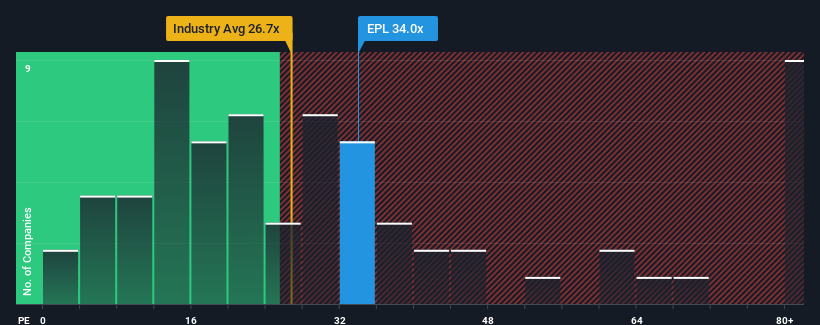A Piece Of The Puzzle Missing From EPL Limited's (NSE:EPL) 25% Share Price Climb
EPL Limited (NSE:EPL) shareholders have had their patience rewarded with a 25% share price jump in the last month. Notwithstanding the latest gain, the annual share price return of 6.0% isn't as impressive.
In spite of the firm bounce in price, you could still be forgiven for feeling indifferent about EPL's P/E ratio of 34x, since the median price-to-earnings (or "P/E") ratio in India is also close to 33x. Although, it's not wise to simply ignore the P/E without explanation as investors may be disregarding a distinct opportunity or a costly mistake.
EPL could be doing better as its earnings have been going backwards lately while most other companies have been seeing positive earnings growth. It might be that many expect the dour earnings performance to strengthen positively, which has kept the P/E from falling. If not, then existing shareholders may be a little nervous about the viability of the share price.
See our latest analysis for EPL

What Are Growth Metrics Telling Us About The P/E?
The only time you'd be comfortable seeing a P/E like EPL's is when the company's growth is tracking the market closely.
Retrospectively, the last year delivered a frustrating 6.3% decrease to the company's bottom line. As a result, earnings from three years ago have also fallen 12% overall. Therefore, it's fair to say the earnings growth recently has been undesirable for the company.
Looking ahead now, EPS is anticipated to climb by 29% each year during the coming three years according to the eight analysts following the company. With the market only predicted to deliver 22% per year, the company is positioned for a stronger earnings result.
In light of this, it's curious that EPL's P/E sits in line with the majority of other companies. Apparently some shareholders are skeptical of the forecasts and have been accepting lower selling prices.
The Key Takeaway
EPL's stock has a lot of momentum behind it lately, which has brought its P/E level with the market. It's argued the price-to-earnings ratio is an inferior measure of value within certain industries, but it can be a powerful business sentiment indicator.
We've established that EPL currently trades on a lower than expected P/E since its forecast growth is higher than the wider market. When we see a strong earnings outlook with faster-than-market growth, we assume potential risks are what might be placing pressure on the P/E ratio. It appears some are indeed anticipating earnings instability, because these conditions should normally provide a boost to the share price.
A lot of potential risks can sit within a company's balance sheet. You can assess many of the main risks through our free balance sheet analysis for EPL with six simple checks.
If you're unsure about the strength of EPL's business, why not explore our interactive list of stocks with solid business fundamentals for some other companies you may have missed.
Valuation is complex, but we're here to simplify it.
Discover if EPL might be undervalued or overvalued with our detailed analysis, featuring fair value estimates, potential risks, dividends, insider trades, and its financial condition.
Access Free AnalysisHave feedback on this article? Concerned about the content? Get in touch with us directly. Alternatively, email editorial-team (at) simplywallst.com.
This article by Simply Wall St is general in nature. We provide commentary based on historical data and analyst forecasts only using an unbiased methodology and our articles are not intended to be financial advice. It does not constitute a recommendation to buy or sell any stock, and does not take account of your objectives, or your financial situation. We aim to bring you long-term focused analysis driven by fundamental data. Note that our analysis may not factor in the latest price-sensitive company announcements or qualitative material. Simply Wall St has no position in any stocks mentioned.
Have feedback on this article? Concerned about the content? Get in touch with us directly. Alternatively, email editorial-team@simplywallst.com
About NSEI:EPL
EPL
Manufactures and sells plastic packaging materials in the form of multilayer collapsible tubes, corrugated boxes, and laminates in the Americas, Europe, Africa, the Middle East, South Asia, and the East Asia Pacific.
Very undervalued 6 star dividend payer.
Similar Companies
Market Insights
Weekly Picks


Crazy Undervalued 42 Baggers Silver Play (Active & Running Mine)


Fiducian: Compliance Clouds or Value Opportunity?

Willamette Valley Vineyards (WVVI): Not-So-Great Value
Recently Updated Narratives

Watch Pulse Seismic Outperform with 13.6% Revenue Growth in the Coming Years

Significantly undervalued gold explorer in Timmins, finally getting traction

Moderation and Stabilisation: HOLD: Fair Price based on a 4-year Cycle is $12.08
Popular Narratives


MicroVision will explode future revenue by 380.37% with a vision towards success


NVDA: Expanding AI Demand Will Drive Major Data Center Investments Through 2026





